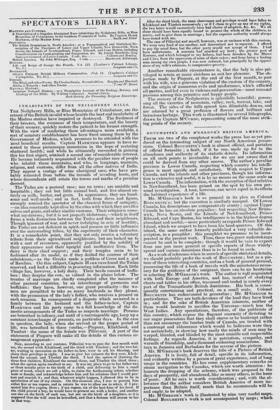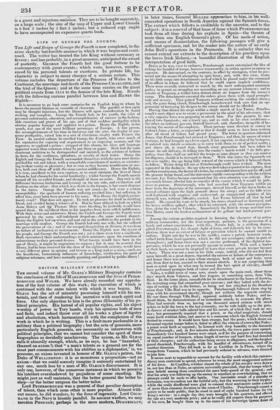BOUCHETTE'S AND leGREGOR'S BRITISH AMERICA.
THE SE are two of the completest works the press has as yet pro- duced on the interesting subject of our North American posses- sions. Colonel BoucnErres book is almost official, and partakes of official formality ; a fault, if it be one, made up for in the abundance and authority of its statistic details. Its information on all such points is invaluable ; for we are not aware that it could be derived from any other source. The author's peculiar province is Lower Canada, respecting which country his intelli- gence is most specific and satisfactory. With respect to Upper Canada, and the islands and other provinces, though his informa- tion is extensive and useful, it is by no means on the same scale as Lower Canada. The information, with the exception of that relative to Newfoundland, has been gained on the spot by his own per- sonal investigation. A tour, however, can never equal in its effects the habitual experience of a life.
Mr. M`Gaiwea's book is as general in its plan as Colonel BOUCHETTE'S ; but the execution is similarly unequal. Of Lower Canada, his descriptions are comparatively scanty ; against Upper Canada he has an absolute prejudice' but respecting NewBruns- wick, Nova Scotia, and the Islands of Newfoundland, Prince Edward, and Cape Breton, his intelligence is in the highest degree abundant and useful,—more particularly as regards Prince Edward Island, which we suspect to have been his head-quarters. Of this island, the same author formerly published a very valuable de- scription, in a pamphlet: this pamphlet we presume to be incor- porated in the present work. Thus, these two great undertakings cannot be said to be complete; though it would be vain to expect from one pen more general or specific reports of these widely- spread and various dominions than is to be found in each.
As a work of reference when in search of specific statistical details, we should probably prefer the work of BOUCHETTE ; but as a pic- ture of these interesting countries, and as a book of general perusal, possessing the life of a book of travels with the minuteness neces- sary for the guidance of the emigrant, there can be no hesitation in selecting Mr. M`GaeGoa's work. The author is wc11 acquainted with both Europe and America, and has, instead of studying charts and tables in his office, traversed and traded in nearly every part of the Transatlantic British dominions. His book is conse- quently entertaining and practical, on a small scale. Colonel BOUCHETTE has endeavoured to generalize ; Mr. NPGREGOR to particularize. They are both devotees of the land they have lived in ; and for the sake of British American interests, neither of them would hesitate to sacrifice the Universe—much less the West Indies. Any speculations, therefore, of the publicists of this country, which expose the flagrant enormity of dictating to our sugar possessions that they shall starve or be bankrupt rather than not encourage the lumber trade of Canada, are treated with a contempt and abhorrence which would be ludicrous were they not melancholy, in showing how easily the minds of men may be warped, blunted, and blinded by the most amiable and respectable feelings. As regards America, it is patriotism, sympathy, and warmth of friendship, and a thousand endearing associations. But turn to Jamaica and Barbadoes for the reverse of the picture.
Mr. M‘Gamo OR'S book deserves the title of a Picture of British America. It is lively, full of detail, specific in its information, and evidently written by a person of great experience, and of long usage in the countries. He has some supplementary remarks on steam navigation to the Canadas, which are worth attention : he laments the dropping of the scheme, which was proposed in the days of prosperity, and abandoned, like so many others, in the hour of panic. All he says is worth consideration ; and, with the al-
lowance that the author considers British America of more im- portance than Britain itself, much that he recommends will be and ought to be adopted.
Mr. M`GREGoR's work is illustrated by nine very useful maps. Colonel BOUCHETTE'S work is not accompanied by maps; which is a great and injurious omission. They are to be bought separately, on a large scale ; the size of the map of Upper and Lower Canada is 6 feet 3 inches by 3 feet 3 inches; but a reduced copy ought to have accompanied an expensive quarto book.



























 Previous page
Previous page